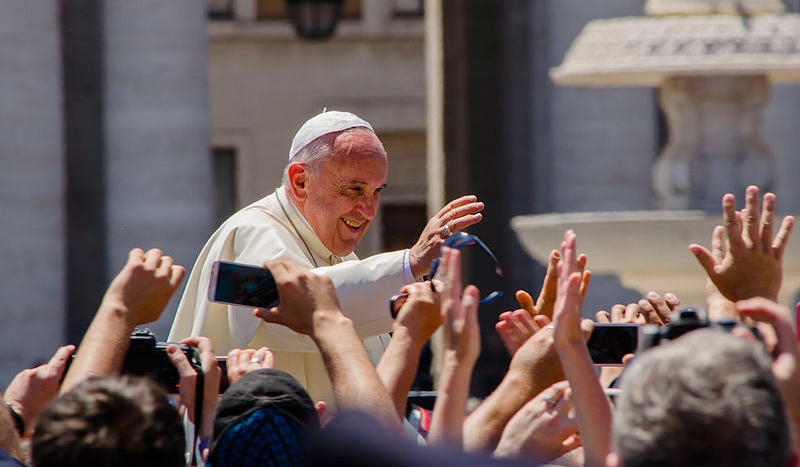Pope Francis slams GMOs and pesticides

Pope Francis has attacked both GMOs and pestcicides in a draft of his major environmental document that was leaked Monday. He has also called for the financing of independent and interdisciplinary research to study GMOs.
On the subject of GMOs Pope Francis states; “It is difficult to give an overall judgment on the development of genetically modified organisms (GMO), plant or animal, for medical purposes or in agriculture, since they can be very different and require different considerations.”
The EU has one of the toughest genetically modified food regulations in the world and the cultivation of GM crops is only allowed following a thorough risk assessment.
But recently the Council agreed to a proposal to give member states more flexibility to deal with GMOs on their own territory.
MEPs voted to remove the Council-backed idea of a phase of negotiations with the GMO company, and supported plans to allow member states to ban GMO crops on environmental grounds.
Health and Food Safety Commissioner Vytenis Andriukaitis said: "I am pleased to deliver on one of the important commitments taken by this Commission, reviewing the legislation on the decision-making process on GMOs.
"The Commission has listened to the concerns of many European citizens, reflected in the positions expressed by their national governments.
"Once adopted, today's proposal will, fully in line with the principle of subsidiarity, grant Member States a greater say as regards the use of EU- authorised GMOs in food and feed on their respective territories."
Pope Francis said: “Although we do not have definitive evidence about the damage that transgenic cereals could cause to humans, and in some regions their use has produced economic growth that has helped solve some problems, there are significant problems that should not be minimized.
"In many areas, following the introduction of these crops, there has been a concentration of productive land in the hands of the few, due to the gradual disappearance of small producers, who, as a consequence of the loss of cultivated land, have been forced to retreat from direct production.
“The most fragile among them become temporary workers and many farm workers migrate to end up in miserable urban settlements. The spread of these (GM) crops destroys the complex web of ecosystems, decreases diversity in production and affects the present and the future of regional economies. In several countries there is a trend in the development of oligopolies in the production of seeds and other products needed for cultivation, and the dependence deepens when you consider the production of sterile seeds, which end up forcing farmers to buy (seeds) from producers.
“No doubt there is a need for constant attention…to consider all ethical aspects involved. To this end it is necessary to ensure a scientific and social debate that is responsible and large, able to consider all the information available and to call things by their names.
“GMOs is an issue which is complex, it must be approached with a sympathetic look at all its aspects, and this requires at least one more effort to finance several lines of independent and interdisciplinary research… as we have seen in this chapter, the technique is unlikely to be able to …self-limit its power.”
On pesticides Pope Francis states; “We get sick, for example, due to inhalation of large amounts of smoke produced by fuels used for cooking and heating. This is added to by….fertilizers, insecticides, fungicides, herbicides and toxic pesticides in general. Technology that is linked to finance, claims to be only solving problems…this solves a problem by creating others.
“It creates a vicious circle in which the intervention of the human being to solve a problem often worsens the situation further. For example, many birds and insects die out as a result of toxic pesticides created by technology, they are useful to agriculture itself, and their disappearance will be compensated with another technological intervention that probably will bring new harmful effects… looking at the world we see that this level of human intervention, often in the service of finance and consumerism, actually causes the earth we live in to become less rich and beautiful, more and more limited and gray, while at the same time the development of technology and consumerism continues to advance without limits.”








